
FORMAL ASPECTS OF COMPUTING
Scope & Guideline
Elevating Standards in Computing Research and Practice
Introduction
Aims and Scopes
- Formal Specification:
Research on methods for formally specifying the behavior and properties of software and systems to ensure they meet required standards. - Verification Techniques:
Exploration of techniques for verifying correctness and reliability of systems, including model checking, theorem proving, and runtime verification. - Application of Formal Methods:
Application of formal methods across various domains, including safety-critical systems, cybersecurity, and autonomous systems. - Integration with Other Disciplines:
Interdisciplinary approaches that combine formal methods with machine learning, artificial intelligence, and other fields to enhance system robustness and reliability. - Modeling and Analysis:
Development of models for complex systems and analysis techniques to evaluate their performance, safety, and security.
Trending and Emerging
- Integration of Machine Learning and Formal Methods:
The intersection of machine learning and formal verification is gaining attention, highlighting the need for reliable AI systems through formal guarantees. - Cyber-Physical Systems Verification:
Research focusing on the verification of cyber-physical systems is on the rise, emphasizing the importance of safety and reliability in interconnected environments. - Probabilistic and Stochastic Models:
There is an increasing interest in probabilistic models and their formal verification, catering to systems where uncertainty and variability are integral. - Automated and Semi-Automated Verification Techniques:
The push for automation in verification processes is evident, with new tools and methodologies being developed to enhance efficiency and scalability. - Formal Methods for Security Applications:
The application of formal methods in security, particularly in the context of IoT and networked systems, is emerging as a significant area of focus.
Declining or Waning
- Traditional Software Verification:
There has been a noticeable decline in papers focused solely on traditional software verification methods, as more advanced and integrated approaches become prevalent. - Static Analysis Techniques:
While still relevant, the frequency of publications on basic static analysis techniques has diminished in favor of more dynamic and hybrid methods that incorporate runtime checks. - Manual Formal Verification:
The reliance on manual verification processes is waning, as automated tools and frameworks gain traction, leading to a decrease in research that emphasizes manual approaches. - Classical Logic Applications:
Research centered on classical logic applications in formal verification is less prominent, as more complex and probabilistic logics are being favored for contemporary challenges.
Similar Journals
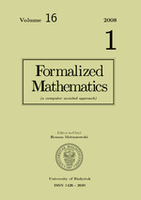
Formalized Mathematics
Connecting Mathematicians and Computer Scientists GloballyFormalized Mathematics is a pioneering open-access journal published by SCIENDO, dedicated to the field of formalized systems and mathematical foundations. Since its inception in 2006, it has provided a platform for researchers to discuss and disseminate advancements in applied mathematics and computational mathematics, emphasizing formalization in mathematical reasoning. Although recent coverage in Scopus has been discontinued, the journal still serves as a valuable resource for academics looking to deepen their understanding of formalized approaches to mathematical problems. With its ISSN 1898-9934, the journal not only promotes unrestricted access to quality research but also facilitates collaboration among mathematicians and computer scientists. Given its rankings—20th percentile in Applied Mathematics and 18th percentile in Computational Mathematics—Formalized Mathematics is a vital conduit for innovative research, making it a significant asset for students, professionals, and scholars aiming to explore the intersection of mathematics and formal logic.
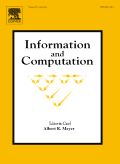
INFORMATION AND COMPUTATION
Fostering Scholarly Excellence in Information and ComputationINFORMATION AND COMPUTATION is a peer-reviewed academic journal published by Academic Press Inc., Elsevier Science, dedicated to advancing the fields of computational theory and mathematics, computer science applications, and information systems. With an ISSN of 0890-5401 and an E-ISSN of 1090-2651, the journal provides a platform for innovative research that spans theoretical and applied perspectives. Acknowledged for its impact in the community, it holds a Q2 quartile ranking in several categories, including Computational Theory and Mathematics and Computer Science Applications, as of 2023. These rankings place it among the leading journals in its field, making it an essential resource for researchers, professionals, and students aiming to stay abreast of cutting-edge developments. While it does not currently offer Open Access options, the journal intends to foster scholarly communication and knowledge sharing from its inception in 1987 to its future issues expected through 2024. Located in the United States, at 525 B ST, STE 1900, SAN DIEGO, CA 92101-4495, INFORMATION AND COMPUTATION is committed to publishing high-quality research that influences the theoretical foundations and practical applications of its diverse disciplines.

Logic and Logical Philosophy
Unraveling the Threads of ReasonLogic and Logical Philosophy is a distinguished journal published by Nicolaus Copernicus University Torun, Poland. With its ISSN 1425-3305 and E-ISSN 2300-9802, the journal has established itself as a premier outlet for cutting-edge research in the field of philosophy, specifically focusing on the intricate intersections of logic and philosophical inquiry. Since its inception, the journal has consistently demonstrated its impact within the academic community, achieving a commendable Q1 ranking in the 2023 Arts and Humanities category, placing it in the 73rd percentile of publications in the field. The journal aims to foster scholarly dialogue and contribute significantly to the advancement of philosophical understanding through rigorous research articles, critical reviews, and discussions. With a commitment to high academic standards and accessibility—though specific access options may vary—Logic and Logical Philosophy remains an essential resource for researchers, professionals, and students alike, paving the way for innovative philosophical discourse until 2024 and beyond.

THEORY OF COMPUTING SYSTEMS
Unraveling the Mysteries of Computational TheoryTHEORY OF COMPUTING SYSTEMS, published by SPRINGER, is a renowned journal that has been a cornerstone in the fields of computational theory and theoretical computer science since its inception in 1996. With an ISSN of 1432-4350 and an E-ISSN of 1433-0490, this journal is committed to disseminating high-quality research that explores the underlying principles of computing systems and their theoretical foundations. Positioned in the Q2 category for both Computational Theory and Mathematics and Theoretical Computer Science, it plays a vital role in advancing scholarly dialogue and innovation within these disciplines, as evidenced by its rankings within the Scopus index. Researchers and professionals can access this journal in various formats, ensuring that cutting-edge research is readily available for a global audience. With a clear focus on fostering interdisciplinary collaboration and exploring emerging trends, THEORY OF COMPUTING SYSTEMS is essential reading for anyone interested in the evolution of computing theory and its applications.
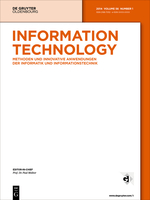
IT-Information Technology
Shaping the Future of Technology Through ResearchIT-Information Technology, published by WALTER DE GRUYTER GMBH, is a prestigious academic journal based in Germany that focuses on the multifaceted developments in the field of information technology. With an impressive Q2 ranking in Computer Science (Miscellaneous) and a Scopus ranking of #87 out of 232, this journal serves as a vital resource for researchers, professionals, and students interested in the latest advancements and research across various aspects of IT. Although currently operating under traditional access options, its rich repository of knowledge spans significant periods, notably from 1987 to 1988 and 1996 to 2024, making it essential reading for those seeking to deepen their understanding of computational innovations and methodologies. The journal's commitment to publishing high-quality research ensures that it remains a key player in shaping the discourse within the IT community.

Journal of Computer Security
Driving the evolution of safety and reliability in technology.Welcome to the Journal of Computer Security, a premier publication dedicated to advancing the field of cybersecurity and digital safety. Published by IOS PRESS, this esteemed journal has been at the forefront of research since its inception, with a rich history spanning from 1992 to 2024. Based in the Netherlands, the journal aims to provide a reputable platform for researchers and professionals to disseminate innovative findings in various subfields, including computer networks, hardware architecture, and software engineering. With its current Q3 ranking across multiple categories and a focus on safety, risk, reliability, and quality, the journal plays a critical role in shaping contemporary discourse and fostering collaboration within the cybersecurity community. Though it is not an open-access journal, the Journal of Computer Security remains a vital resource for academics and practitioners alike, offering access to significant advancements and methodologies that guide the evolution of security practices worldwide. Engage with us and contribute to this dynamic field of study!
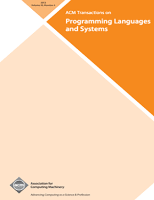
ACM TRANSACTIONS ON PROGRAMMING LANGUAGES AND SYSTEMS
Shaping Tomorrow's Programming Paradigms TodayACM Transactions on Programming Languages and Systems (ISSN: 0164-0925, E-ISSN: 1558-4593) is a prestigious journal published by the Association for Computing Machinery, focusing on advancing the field of programming languages and systems. Established in 1979, this enduring publication has become a significant resource for researchers and practitioners alike, with a convergence extending to 2024. The journal maintains a strong presence in the academic community, currently placed in the Q2 category for Software in 2023, demonstrating its commitment to high-quality research. With a Scopus ranking of #260 out of 407 in Computer Science Software, it highlights a unique niche that bridges theoretical foundations and practical implementations. Although it does not offer open access, the journal ensures quality dissemination of tools, methodologies, and innovations that cater to both seasoned professionals and emerging scholars. The ACM Transactions on Programming Languages and Systems thus plays a crucial role in shaping the future of programming languages and their applications, making it an essential read for anyone vested in the field.
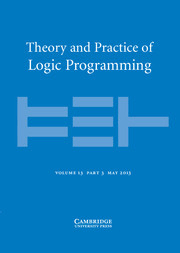
THEORY AND PRACTICE OF LOGIC PROGRAMMING
Fostering Scholarly Dialogue in the Realm of Logic Programming.THEORY AND PRACTICE OF LOGIC PROGRAMMING, published by Cambridge University Press, is a premier academic journal that delves into the evolving field of logic programming, offering insights and advancements from 2001 to 2024. With an ISSN of 1471-0684 and an E-ISSN of 1475-3081, this journal serves as a vital resource for researchers, professionals, and students interested in areas such as artificial intelligence, computational theory, and software development. In 2023, the journal was recognized for its excellence, achieving Q1 status in Computational Theory and Mathematics and Q2 in several other categories, underscoring its significant impact within the academic community. Despite not being open access, its robust content, curated by esteemed scholars, guarantees high-quality research and innovative methodologies that are crucial for advancing the field. The journal's rigorous peer-review process and its standings in Scopus rankings further emphasize its relevance and authority, making it a quintessential platform for disseminating key findings and fostering scholarly dialogue.
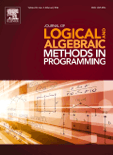
Journal of Logical and Algebraic Methods in Programming
Unlocking New Frontiers in Programming Logic and Methodologies.The Journal of Logical and Algebraic Methods in Programming (ISSN: 2352-2208, E-ISSN: 2352-2216) is a prestigious publication by Elsevier Science Inc, dedicated to advancing the fields of computational theory, programming logic, and mathematical methodologies. Esteemed in its commitment to high-quality research, this journal holds a Q2 ranking in 2023 for Computational Theory and Mathematics, and is recognized in various other disciplines including Logic and Software Studies. The journal’s open access policy enhances its visibility and accessibility, ensuring that cutting-edge research reaches a wider audience of researchers, professionals, and students. With an impressive convergence timeline from 2014 to 2025, it is a vital resource for those seeking to explore innovative algorithms and their applications in diverse areas of informatics. The Journal of Logical and Algebraic Methods in Programming represents a unique intersection of logic, mathematics, and software, carving a significant place in the scholarly discourse of theoretical computer science.

ACTA INFORMATICA
Unveiling Breakthroughs in Computer Networks.ACTA INFORMATICA is a prestigious academic journal published by Springer, dedicated to advancing the fields of computer networks and communications, information systems, and software engineering. With an ISSN of 0001-5903 and an E-ISSN of 1432-0525, the journal has continued to thrive since its inception in 1971 and is set to cover research up until 2024. Although it currently operates within a Q3 category in its respective fields, it is recognized for providing a platform for high-quality, peer-reviewed research, which is essential for fostering innovation and knowledge dissemination in computer science. While it does not offer an open access option, scholars benefit from its rigorous editorial standards and comprehensive coverage of significant trends and methodologies. The journal is conveniently based in New York, NY, USA, further enhancing its accessibility to a global audience. Researchers, professionals, and students alike will find ACTA INFORMATICA a valuable resource for staying abreast of the latest developments and breakthroughs in this vital area of study.